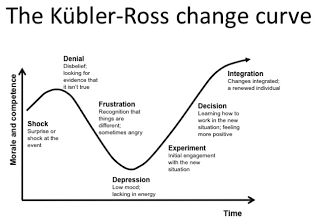Change
 I have two dear friends, a couple, married with beautiful and sweet little daughter as all children are. They live in a fine house, on a fine spot and their all basic needs are met. They even have successful careers as much as something like that is possible in Croatia. They have friends, parents that are still alive, hobbies, two cars... I talked to them five months ago and I asked them how things are goin' and they replied not very well. Their relationship is crumbling apparently for no reason. I said that I understand that. This blog post goes for you guys. I hope you're still together and that you have found a way to settle "things".
I have two dear friends, a couple, married with beautiful and sweet little daughter as all children are. They live in a fine house, on a fine spot and their all basic needs are met. They even have successful careers as much as something like that is possible in Croatia. They have friends, parents that are still alive, hobbies, two cars... I talked to them five months ago and I asked them how things are goin' and they replied not very well. Their relationship is crumbling apparently for no reason. I said that I understand that. This blog post goes for you guys. I hope you're still together and that you have found a way to settle "things".So, what I understand?
I understand that feeling when it seems that all things are falling apart. I understand dissatisfaction and unbearable feeling of everyday life, frustration because things aren't the way they suppose to be. And I'm not talking about things I cannot influence like current government politics or catastrophic global economic situation or infant behavioural patterns of my closest working partners. I'm talking about things I can influence, I'm talking about things that only I can change. I'm talking about myself.
If we fail to do that, we'll – most probably – regress in state before the change with one catch. the change can't be undone, at least not completely. We can abort it's manifestation in the outside world but we can't ignore it inside. We can, of course, push it in the subconscious. If we do that, retract or fail to conduct the change in the outside world, we'll become – if we have a habit to blame ourselves – disappointed, sad from time to time or even depressed. If we have a habit to blame others, then we'll become bitter people, angry, cynical, and even aggressive. Joy in our lives, in both cases, will vanish in time and we'll slowly fade away. Probably in both cases we'll start to abuse alcohol or something else – drugs, sex, food or work because we need to forget what we have refused to do – to change ourselves, to change the way we live, to become something else then what we are now.
 The Kubler Ross Change Curve
The Kubler Ross Change CurveThe change in many cases is not radical – we do not need to quit our jobs, get divorced, kill our mothers, go to the mountains, throw away iPhone or change our gender. Most likely it will manifest itself in small things – the way we talk to the people, the way we listen to them, the way we manage our daytime routine. In some cases we'll need to leave some people, in other we'll need to find some people. Maybe we'll watch less TV, change our eating habits or spend more time with the family. Or less. :-) That all depends on what needs to be changed and there is one more catch – to successfully conduct the change in our lives we need to get to the bottom of our motivation. We need to detect what is the root of our need to change – what needs to be changed and why. When we learn that, then we can decide how we'll do it right. The trick in all this is that when we recognise our dissatisfaction as urge for change, our defence mechanism will activate and mercilessly use everything at its disposal to stop the change. Confusion, fear, panic attacks, unwillingness, boredom, enthusiasm to do something completely useless for us – everything! How to recognise what is the plot of defence mechanism? Ask yourself: this what I'm doing, feeling and thinking right now – does it lead me to change my life for better or not? Am I constructive or destructive?
How can we be sure we're on the right way? We can't. We need to try and made mistakes, trial and error – gather experience, become wiser. :-)
Digression: Couple of weeks ago a reminiscence from my childhood struck me like a lightning: I'm trying to do something and I'm failing and trying again and again and again (I think at that time I called that: exploring). I realised at that moment that I have completely forget to try, fail, explore and, actually, learn new things. I realised that I haven't been doing that since I was in elementary school. Instead of doing things, making mistakes, keep doing it until I succeed i.e. exploring and learning (that's what all kids are doing all the time!), I'm acting like I know everything, I'm embarrassed when I don't know something and I'm hiding when I make mistake. And that is the only mistake. End of digression. :-)
If we manage to manoeuvre through all this and change what needs to be changed, there is one last catch – change is not permanent. Not in the way that we cannot regress anymore and not in a way "that's it!" Change comes in cycles and is everlasting because we are infinitely improvable.
:-)
Happy changing!
Published on May 15, 2013 03:02
No comments have been added yet.



